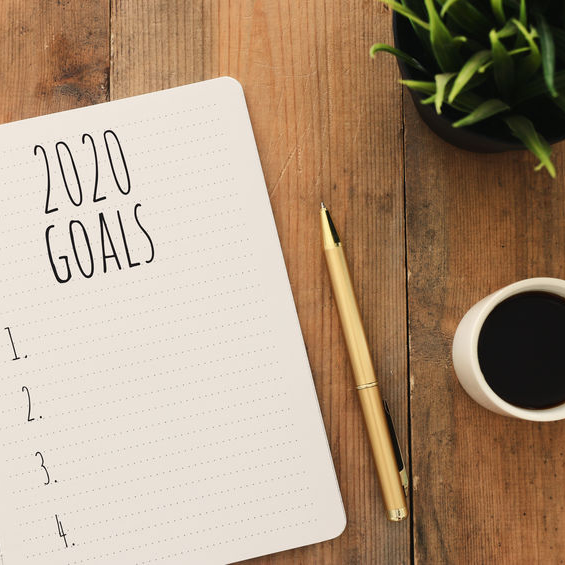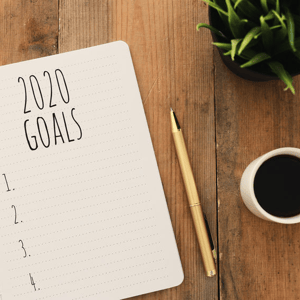A New Year Resolution: eliminating wasteful sales behaviours
December 18, 2020

 This is the time of year when most of us would benefit from some quiet reflection on what we’ve learned during 2020, and how we intend to apply that learning in the New Year.
This is the time of year when most of us would benefit from some quiet reflection on what we’ve learned during 2020, and how we intend to apply that learning in the New Year.
It’s fair to say that for most of us the learning opportunities have been dramatic.
For anyone involved in complex B2B sales, the way in which we interact with our customers and prospects has been turned upside down.
Business models that traditionally relied on face-to-face in-the-room interaction have had to rapidly go virtual.
Many of our customers - often the majority - have become understandably more cautious about making major new investments - whilst others (often a minority, but an important one) have seen opportunity in the disruption and have accelerated their adoption of new approaches.
However 2021 turns out in practice, the future world of B2B selling will have irreversibly changed. A Darwinian “survival of the fittest” is already underway at both the organisational and individual level, and the ability to adapt and evolve to changing circumstances is going to be a critical success factor.
Rethinking our approach
Rethinking our sales processes offers a tremendous opportunity to confront behaviours and assumptions that we might have accepted in previous times. For many members of the sales community, sales has often been an inherently wasteful activity, with a level of ultimately unproductive activity that would not be regarded as acceptable in many other professions.
In any complex and fast-moving environment or profession, sustained perfection is an impossible goal - but as sales professionals we can always strive to improve by identifying and eliminating the avoidable errors that prevent us from consistently performing closer to the peak of our potential.
And that’s what I suggest sales people, managers and leaders should commit to do as the basis for their New Year’s sales resolutions: take time to systematically acknowledge and deal with the accumulation of wasteful habits and behaviours that have been holding them back.
Let me start by defining what “waste” means in the context of B2B sales. At a high level, waste is anything that fails to contribute any useful value to the prospect or customer, to the sales person or the sales organisation they work for.
Waste is a sales conversation that leaves none of the participants any the wiser at the end. Waste is a stream of sales activities that fail to make any meaningful progress. Waste is clinging on to a sales opportunity that is never likely to close, for fear it would make your pipeline appear smaller if you disqualified it.
Waste involves the types of activity that leave some or all of the participants wondering why they bothered to do it in the first place - often accompanied by feelings of regret that the time they have spent can never be recovered and could have been spent so much more productively. Above all, waste is the failure to learn and apply obvious lessons from the results of your actions.
Resolutions for sales leaders
If you are a sales leader at any level, I’d encourage you to rethink your expectations of your sales people. Are the actions you are asking them to perform, the data you are asking them to collect or the CRM fields you are requiring them to complete genuinely creating value for them, for you, for the organisation or for the customer? Would they or you be any less effective if they spent their time more productively?
Which, naturally, leads to the opposite question: what are they not currently doing that is preventing them from being as successful and effective as they could be? How could you redefine your guidance to them in a way that will make them more productive? How can you get all of your salespeople to embrace the behaviours that are enabling your top performers to be consistently successful?
And while you’re at it, please reflect on the amount of time you are dedicating, day after day, week after week and month after month to coaching your salespeople, because it’s almost inevitably not enough. Other than creating a supportive working environment, your investment in effective coaching is the most significant contribution you can make to improving your team’s performance in both the short and long term.
What could you do to strip away all those tasks and expectations that are doing nothing to contribute to your team's productivity, but are instead holding them back? And what could you do to replace them with activities that would allow you and them to actually make a meaningful difference? And if your company's policies are holding your team back, what are you doing to constructively challenge them?
Resolutions for salespeople
Other than communicating to your manager that you need them to strip out unproductive expectations and replace them with productive guidance, what could you do on your own initiative to make a difference to your personal effectiveness?
This must begin with setting and holding yourself to achieving stretching personal goals. The evidence is clear: sales people who hold themselves accountable to clearly defined goals do dramatically better in both the short and long-term than peers who lack clear goals or the determination to achieve them.
Whilst one of these personal goals may (and should be) to exceed your revenue/booking targets, you also need to break these down into the intermediate actions that must be completed to enable you to achieve this ultimate goal.
These leading indicators must be more oriented towards quality than the raw quantity of activity. A smaller number of well-chosen high-quality activities will invariably lead to better outcomes than a larger number of low-quality activities. A universally important metric is the number of advances that you persuade your customers agree to in their buying decision journey.
What’s stopping you from achieving as many meaningful customer advances as you could? Here are a few of the obviously wasteful but all too common sales behaviours:
- The failure to understand and systematically target your most promising potential customers, and as a result wasting your prospecting energies
- The failure to rigorously qualify you potential opportunities, and as a result wasting time pursuing opportunities that are never going to close
- The failure to set and achieve clear goals for every significant customer interaction, and as a result failing to advance your customer’s decision process
- The failure to strongly promote the case for change, and as a result having far too many apparently promising opportunities end in a decision to “do nothing”
- Time spent on anything that does not create value for the prospect or customer, for the sales organisation or for you as a sales person
A few moment’s thoughtful reflection will probably generate a number of avoidable sources of error and waste. When times are good, the average sales person - if they are lucky - can sometimes get away with this sort of wasteful behaviour. But when times are challenging, and when the environment is changing rapidly, this level of waste cannot be justified or sustained.
What could you choose to do differently?
Whether you’re thinking about this from the perspective of a sales leader or an individual contributor, I’d encourage you to consider and establish your goals for 2021, and to concentrate on the handful of things that:
- You could stop doing without affecting your performance against your goals
- You need to start doing in order to give you the best possible chance of achieving your goals
- You may be currently doing, but could be far more effective with a few simple changes
Some things are certain: simply carrying on as you are will not be enough. Adding to your list of tasks without eliminating the wasteful and unproductive existing ones won’t help, either. And failing to improve the “somewhat successful” approaches you have already been applying will also cause you to fall short.
So - what goals are you going to set for yourself? What wasteful behaviours are you going to eliminate for 2021? And what are you going to do differently instead?
About the Author
 Bob Apollo is a Fellow of the Association of Professional Sales, a founding contributor to the International Journal of Sales Transformation, a recognised Sales Futurist, an active member of the Sales Experts Channel, and the driving force behind Inflexion-Point Strategy Partners, the leading proponents of outcome-centric selling.
Bob Apollo is a Fellow of the Association of Professional Sales, a founding contributor to the International Journal of Sales Transformation, a recognised Sales Futurist, an active member of the Sales Experts Channel, and the driving force behind Inflexion-Point Strategy Partners, the leading proponents of outcome-centric selling.
Following a successful corporate career spanning start-ups, scale-ups and market leaders, Bob now works as a strategic advisor, mentor, trainer and coach to ambitious B2B sales organisations - teaching them how to differentiate themselves through their provably superior approach to achieving their customer's desired outcomes.


Comments